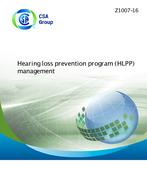CSA Z1007-16
Preface
This is the first edition of CSA Z1007, Hearing loss prevention program (HLPP) management. This Standard sets out requirements for, and provides comprehensive guidance on, the management of HLPPs designed to protect individuals exposed to occupational noise. This management system Standard is designed to serve as the basis for other CSA Group hearing conservation Standards. Once effective management for the HLPP is established using this Standard, professionals involved in the HLPP can use detailed requirements and application guidelines in those other Standards for specifying equipment and processes to be incorporated in the HLPP. This Standard strikes a balance between the latest best practices in hearing loss prevention and current regulations in various Canadian jurisdictions. Some of the requirements, therefore, are more stringent than existing regulations. Each section in this Standard contains both normative clauses (where compliance is required or recommended) and informative clauses (providing explanatory information and best practices). For the most part, the informative clauses precede the normative clauses in each section. By permission of Standards Australia and Standards New Zealand, AS/NZS 1269.0:2005 was used as a seed document for the development of part of this Standard. By permission of The National Institute of Occupational Safety and Health, a division of the United States Center for Disease Control, parts of this Standard are based on Criteria for a Recommended Standard: Occupational Hearing Conservation Program (Revised Criteria 1998), and Preventing Occupational Hearing Loss ? A Practical Guide. CSA Group acknowledges that the development of this Standard was made possible, in part, by the financial support of federal, provincial, and territorial governments? occupational health and safety agencies.
Scope
1.1 General This Standard specifies requirements for the management of hearing loss prevention programs (HLPPs) designed to protect individuals from occupational hearing loss. 1.2 Subjects addressed Following principles set out in CAN/CSA-Z1000, this Standard specifies requirements for a) management commitment, leadership, and participation; b) assignment of roles and responsibilities; c) identification and quantification of noise hazards; d) selection and application of controls; e) provision of protection (e.g., hearing protection devices); f) training, monitoring, and measurement (e.g., noise exposure and audiometric testing); g) documentation; and h) continuous improvement and management review. 1.3 Subjects not addressed The following subjects are not addressed in this Standard: a) psychological effects of exposure to noise; b) non-auditory effects of noise exposure; and c) non-industrial noise exposure except as it impacts industrial noise exposure. 1.4 Relation to other Standards This Standard is part of CSA Group?s Z1000 series of Standards on management of occupational health and safety. As such, it is based on the OHS management principles in CAN/CSA-Z1000. This Standard is intended to be used with related occupational or technical standards, and referenced by other Standards as the primary set of requirements for management of HLPPs. Note: This Standard reflects practices in hearing loss prevention that are current at the time of publication, and is based on more recent information than some older regulations. As a result, in some subject areas, this Standard is more stringent than current provincially legislated regulations. This Standard complements other CSA Group hearing loss prevention Standards, as follows: a) Z94.2 for hearing protection; b) Z107.56 for measurement of occupational noise exposure; c) Z107.6 for audiometric testing for use in hearing loss prevention programs; and d) Z107.58 for noise emission declarations for machinery. Once an effective management process is established for the HLPP, these other Standards will provide the information needed to detail the program?s requirements. 1.5 Applicability This Standard is designed for use in Canadian workplaces. The principles established in this Standard are based on internationally recognized practices. 1.6 Users? responsibility Hearing loss prevention legislation differs from jurisdiction to jurisdiction in Canada. It is the users? responsibility to determine how applicable legislative requirements relate to this Standard. 1.7 Terminology In this Standard, “shall” is used to express a requirement, i.e., a provision that the user is obliged to satisfy to comply with the standard; “should” is used to express a recommendation or that which is advised but not required; and “may” is used to express an option or that which is permissible within the limits of the standard. Notes accompanying clauses do not include requirements or alternative requirements; the purpose of a note accompanying a clause is to separate explanatory or informative material. Notes to tables and figures are considered part of the table or figure and may be written as requirements. Annexes are designated normative (mandatory) or informative (non-mandatory) to define their application.
Product Details
- Edition:
- 1st
- Published:
- 02/01/2016
- ISBN(s):
- 9781771396813
- File Size:
- 1 file , 6.6 MB
- Product Code(s):
- 2423263, 2424338, 2423263, 2423263
